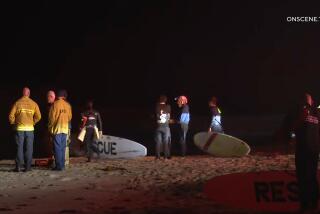No Lifeguard to Save Boy
- Share via
A 4-year-old boy died Monday, one day after he sank to the bottom of a country-club swimming pool near dozens of swimmers and sunbathers in the gated Coto de Caza community in south Orange County.
Alexander Vertun’s death--the sixth community pool drowning in Orange County this year--comes as critics questioned a California law that allows private and public swimming pools to operate without lifeguards.
A manager at the Coto Valley Community Club said about 90 guests were poolside Sunday afternoon when Alexander’s father and 13-year-old brother found him unconscious at the bottom of the pool. No lifeguard was on duty.
Under state law, swimming-pool operators do not need to hire lifeguards as long as they post a sign cautioning that there is no lifeguard.
Only pools that charge a gate fee from swimmers are required to hire lifeguards. Country-club membership fees or homeowners’ association dues are not the same as gate fees and thus, lifeguards aren’t mandatory at places where such money is paid.
That means that lifeguards are required at only a handful of the estimated 160,000 residential and community pools throughout Orange County.
On Monday afternoon, the crowd at the Coto Valley Community Club was much thinner than the previous day. A sign warned patrons that no lifeguard was on duty.
“I think they should definitely employ a lifeguard down here, I mean, just for safety reasons,” said Emily Asalone, 15, who went to the club for a Monday afternoon swim.
*
Officials for the American Red Cross, which certified more than 700 lifeguards in Orange County this year, agree.
“I would definitely recommend that there be a lifeguard on duty the entire time a pool is open,” said Jamie Nellesen, health and safety specialist for the Orange County chapter of the American Red Cross. “It’s much safer.”
Dennis Graham, who manages the country club’s pool, said the drowning was the first serious injury in the history of the club. He vowed to have employees keep a closer watch on patrons, but said it is unlikely lifeguards will be hired.
“From now on, when it really gets busy, we’re going to have someone there full-time watching,” he said.
The boy’s death brings to 12 the number of confirmed drownings in Orange County pools and coastal waters this season, with a few others still under investigation, according to the coroner’s office.
*
The spate of summer drownings in backyard pools, spas and community plunges in recent years has prompted several community organizations to educate the public about the danger. Organizations such as Children’s Hospital of Orange County and the Orange County Fire Authority advocate the installation of gates to keep children away from unattended pools.
Three drownings were reported this year at residential pools.
In 1999, nine victims drowned in home pools and three in community pools, according to the coroner’s records.
In Coto de Caza, one parent said Monday that she believes it is her responsibility, not a lifeguard’s, to look out for her children’s safety.
“We live within walking distance of the club, but I would never send her to swim without supervision,” said Rochelle Tennis, whose 7-year-old daughter participates in synchronized swimming. “At the club, there’s no lifeguard, so it’s my responsibility as a parent to supervise my kids.”
One of the state’s busiest community pools is at Northstar-at-Tahoe, a ski and summer sport resort near Lake Tahoe. Although they aren’t required by law to provide lifeguards, the Northstar Property Owners Assn. spends about $34,000 a year hiring people to watch over 60,000 summertime guests, said Mike Moretti, the association’s general manager.
“Liability-wise, our insurance company says we’d be better off if we didn’t hire lifeguards and put a sign out instead,” Moretti said. “We would feel horrible if somebody died. And we want to be able to control the behavior and the horseplay.”
Because of the costs of employing lifeguards, however, it is unlikely the laws that permit warning signs instead of lifeguards will change, Nellesen said.
“I would like to see that, but we don’t have a whole lot of control over the government, do we?” he said.
More to Read
Sign up for Essential California
The most important California stories and recommendations in your inbox every morning.
You may occasionally receive promotional content from the Los Angeles Times.














